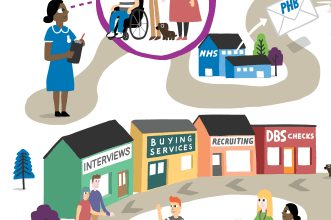coronavirus
It takes more than a global pandemic to dampen spirits in this care home – just ask these care home residents! COVID-19 may have put a stop to much the White Rock Care Home could offer, but with a little creativity and being mindful of measures to prevent cross infection, they have still been able …
If someone had told registered manager Melissa Jones three weeks ago her care home would be filled with the voices, laughter and tears of relatives being reunited with loved ones she wouldn’t have believed them. That was until she received an email from Cornwall Council looking for care homes to take part in a pilot …
After months and months of restrictions, continued uncertainty around work, education and our general health, and the shared anxiety about the future course of this pandemic, we are now in the unusual position of receiving some cautiously optimistic news. Michelle Dyson, our Director General for Social Care, considers what the news of potentially effective COVID-19 …
Advice for people who buy care and support through a direct payment, as well as local authorities, clinical commissioning groups and those who provide care and support has recently been published. The guidance has been produced in part with the help and wise counsel of Simon Wilson and Katherine Wynne, two individuals with lived experience …
Even though the coronavirus pandemic continues to cause stress, anxiety and disruption, it has also created opportunities, spurred innovative thinking and encouraged the forging of new connections. In her role as Head of Commissioning in Adult Social Care, Kate Galoppi and her colleagues collaborated closely with their local voluntary action organisation to identify people interested …
Prior to the first official ‘lockdown’, Hertfordshire County Council took the decision to cease monitoring visits for residential and nursing homes to minimise infection risks. In normal circumstances, Bryony Morris's team would undertake these monitoring and quality assurance visits. In their absence, they soon realised how important it was to make sure care providers continued …
Pop up care homes? Is that a thing? It is now! Tim Baverstock, Deputy Director for Adult Social Care at Somerset County Council, explains how collaboration, goodwill and the determination to get things done created additional resources to cope with increased demand caused by the coronavirus pandemic.
A few months ago, Think Local Act Personal (TLAP)'s Tim Parkin wondered whether their insight group was a foolhardy enterprise or demonstrated remarkable foresight. With the publication of the group’s report into the effects of the pandemic on people who access care and support, as seen through the lens of personalisation, he offers a few …
Anyone working in the care sector – and in residential care settings in particular – knows how vital infection prevention and control is in keeping residents, staff and visitors safe and well. The continued prevalence of COVID-19 in our communities only heightens our collective awareness of this essential line of defence. Back in April, Ruth …
This time last year, no one could have anticipated the world would soon be in thrall to a viral pandemic – one which would affect the lives of all of us in multiple and prolonged ways. In Hertfordshire though, they have a reputation for adapting to the challenging, the complex and the unexpected…









